Related Research Articles

Pope Boniface VIII was the head of the Catholic Church and ruler of the Papal States from 24 December 1294 to his death, in 1303. The Caetani family was of baronial origin, with connections to the papacy. He succeeded Pope Celestine V, who had abdicated from the papal throne. Boniface spent his early career abroad in diplomatic roles.
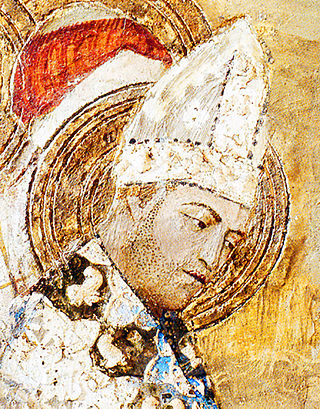
Pope Clement VI, born Pierre Roger, was head of the Catholic Church from 7 May 1342 to his death, in December 1352. He was the fourth Avignon pope. Clement reigned during the first visitation of the Black Death (1348–1350), during which he granted remission of sins to all who died of the plague.

Philip III, called the Bold, was King of France from 1270 until his death in 1285. His father, Louis IX, died in Tunis during the Eighth Crusade. Philip, who was accompanying him, returned to France and was anointed king at Reims in 1271.

Nicephorus Gregoras was a Byzantine Greek astronomer, historian, and theologian. His 37-volume Byzantine History, a work of erudition, constitutes a primary documentary source for the 14th century.
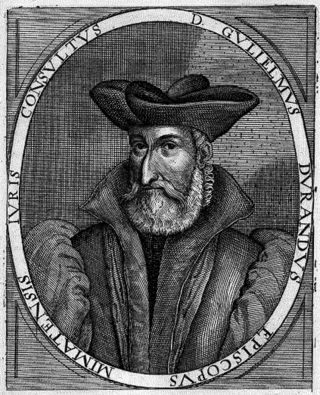
Guillaume Durand, or William Durand, also known as Durandus, Duranti or Durantis, from the Italian form of Durandi filius, as he sometimes signed himself, was a French canonist and liturgical writer, and Bishop of Mende.
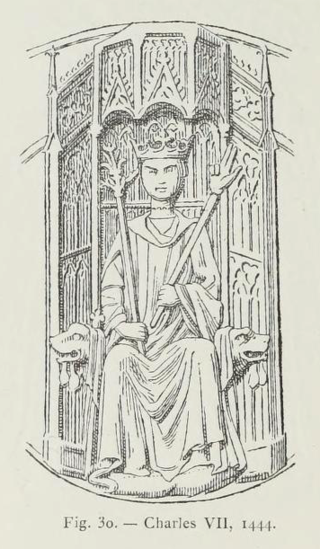
The Pragmatic Sanction of Bourges, issued by King Charles VII of France, on 7 July 1438, required a General Church Council, with authority superior to that of the papacy, to be held every ten years, required election rather than appointment to ecclesiastical offices, prohibited the pope from bestowing and profiting from benefices, and forbade appeals to the Roman Curia from places further than two days' journey from Rome. The Pragmatic Sanction further stipulated that interdict could not be placed on cities unless the entire community was culpable. The king accepted many of the decrees of the Council of Basel without endorsing its efforts to coerce Pope Eugene IV.
Gallicanism is the belief that popular secular authority—often represented by the monarch's or the state's authority—over the Catholic Church is comparable to that of the pope. Gallicanism is a rejection of ultramontanism; it has something in common with Anglicanism, but is nuanced, in that it plays down the authority of the Pope in church without denying that there are some authoritative elements to the office associated with being primus inter pares. Other terms for the same or similar doctrines include Erastianism, Febronianism, and Josephinism.

The Council of Vienne was the fifteenth ecumenical council of the Catholic Church and met between 1311 and 1312 in Vienne, France. One of its principal acts was to withdraw papal support for the Knights Templar at the instigation of Philip IV of France. The Council, unable to decide on a course of action, tabled the discussion. In March 1312 Philip arrived and pressured the Council and Clement to act. Clement passed papal bulls dissolving the Templar Order, confiscating their lands, and labeling them heretics.
Conciliarism was a reform movement in the 14th-, 15th- and 16th-century Catholic Church which held that supreme authority in the Church resided with an ecumenical council, apart from, or even against, the pope.

Pierre d'Ailly was a French theologian, astrologer and cardinal of the Roman Catholic Church.

Odo IV or Eudes IV was Duke of Burgundy from 1315 until his death and Count of Burgundy and Artois between 1330 and 1347, as well as titular King of Thessalonica from 1316 to 1320. He was the second son of Duke Robert II and Agnes of France.

The Metropolitan Archdiocese of Montpellier (–Lodève–Béziers–Agde–Saint-Pons-de-Thomières) is a Latin archdiocese of the Catholic Church in south-western France. It was probably created in the 3rd century AD. The current metropolitan archbishop is Pierre-Marie Carré; the immediate past Archbishop Emeritus is Guy Marie Alexandre Thomazeau. On September 16, 2002, as part of the reshuffling of the map of the French ecclesiastical provinces, the diocese of Montpellier ceased to be a suffragan of Avignon and was elevated to archdiocese and metropolitan of a new ecclesiastical province, with the dioceses of Carcassonne, Mende, Nimes and Perpignan–Elne as suffragans.

Clementia of Hungary was Queen of France and Navarre as the second wife of King Louis X.

The Diocese of Mende is a Latin diocese of the Catholic Church in France. The diocese covers the department of Lozère.
Jacques Almain was a French professor of arts and theology at the University of Paris who died at an early age. Born in the diocese of Sens, he studied Arts at the Collège de Montaigu of the University of Paris. He served as Rector of the University from December 1507 to March 1508.
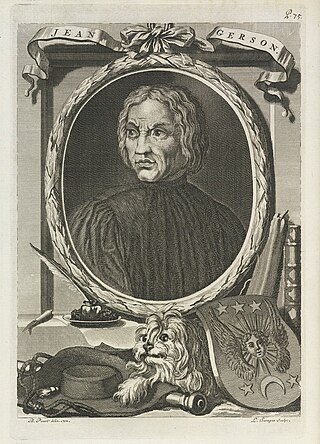
Jean Charlier de Gerson was a French scholar, educator, reformer, and poet, Chancellor of the University of Paris, a guiding light of the conciliar movement and one of the most prominent theologians at the Council of Constance. He was one of the first thinkers to develop what would later come to be called natural rights theory, and was also one of the first individuals to defend Joan of Arc and proclaim her supernatural vocation as authentic.
Faciens misericordiam was a papal bull issued by Pope Clement V on August 12, 1308, as part of the trial against the Knights Templar. It called for a new Ecumenical council to be held in 1310, and set out some structure for the collection of depositions from the arrested Templars.
Guillaume Durand may refer to:

Marsilius of Padua was an Italian scholar, trained in medicine, who practiced a variety of professions. He was also an important 14th-century political figure. His political treatise Defensor pacis, an attempt to refute papal claims to a "plenitude of power" in affairs of both church and state, is seen by some scholars as the most revolutionary political treatise written in the later Middle Ages. It is one of the first examples of a trenchant critique of caesaropapism in Western Europe. Marsilius is sometimes seen as a forerunner of the Protestant reformation, because many of his beliefs were later adopted by Calvin and Luther.
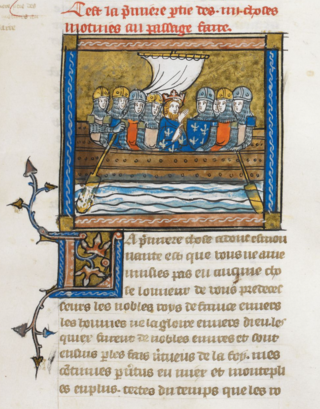
The theme of recovery of the Holy Land was a genre in High–Late Medieval Christian literature about the Crusades. It consisted of treatises and memoranda on how to recover the Holy Land for Christendom, first appearing in preparation for the Second Council of Lyon in 1274. They proliferated following the loss of Acre in 1291, shortly after which the permanent Crusader presence in the Holy Land came to an end, but mostly disappeared with the cancellation of Philip VI of France's planned crusade in 1336 and the start of the Hundred Years' War between England and France the next year. The high point of recovery proposals was the pontificate of Clement V.
References
- Constantin Fasolt, Council and hierarchy: the political thought of William Durant the Younger, Cambridge; New York: Cambridge University Press, 1991.
- Tierney, Brian. Foundations of the Conciliar Theory. Cambridge: Cambridge University Press, 1955.
 This article incorporates text from a publication now in the public domain : Herbermann, Charles, ed. (1913). "Diocese of Mende". Catholic Encyclopedia . New York: Robert Appleton Company.
This article incorporates text from a publication now in the public domain : Herbermann, Charles, ed. (1913). "Diocese of Mende". Catholic Encyclopedia . New York: Robert Appleton Company.